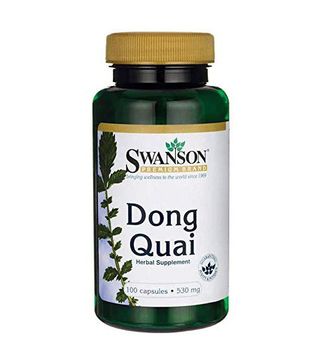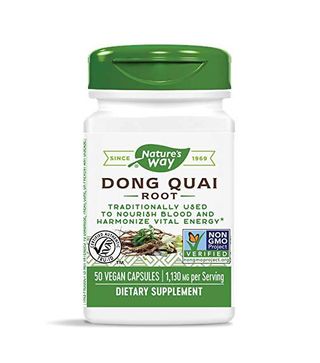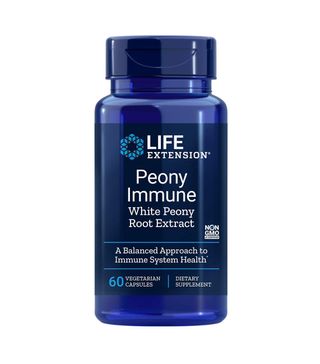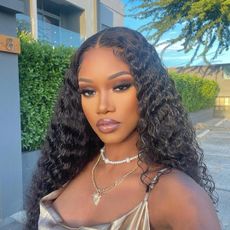True Story: I Went to a Chinese Herbalist to Get My Period Back

Recently, I went to see an amazing Santa Monica–based acupuncturist, Yunuen Beristain, to see what she would have to say about my fluctuating anxiety. The experience was incredibly cathartic and helpful, and although I haven't taken up acupuncture as a regular therapeutic treatment option, Beristain has continued to serve as an amazing resource as I've continued work on getting my health back in tip-top shape.
I say "health" and not just "anxiety levels" because during my appointment with Beristain last November, I had also mentioned a slight issue with my period: It's been, oh, 98% MIA for years. And since traditional Chinese medicine is incredibly holistic in nature and takes into account the whole picture regarding symptoms and causation, she expressed some concern. And ultimately, at the end of our session, she gave me the name of a local Chinese herbalist, Yuhong Chen, PhD, who she felt could provide some insight and perhaps prescribe me a customized formula of herbs to help support my irregular periods.
So business card in hand and somewhat intrigued, I headed back to my car, trucked through the rest of the winter, and, if I'm being completely honest, forgot about the recommendation. Because, yes, while TCM and acupuncture deeply interest me, I couldn't help but have a slight hint of skepticism. I'd never tried Chinese herbs or seen a master of Chinese medicine (like Chen), but I have seen a number of holistic and alternative medical professionals over the years who have recommended various herb- and plant-based capsules and elixirs—none of which have proved helpful in regulating or retrieving my period.
However, a couple of months ago, I was working on this article (addressing the importance of getting a natural period not induced by birth control), and I became re-inspired to try to get my period back. After all, its absence has become the (abnormal) norm, and my game plan has slowly veered lackadaisical after years of frustration and dead ends. So I reconnected with Beristain to gain some more information regarding the correlation between period health, acupuncture, and TCM in general, and also made an appointment with Chen to see about that herb formula. Keep reading to find out everything I learned from both experts on the topic and which herbs I've started taking in an effort to regulate my period.
The Appointment
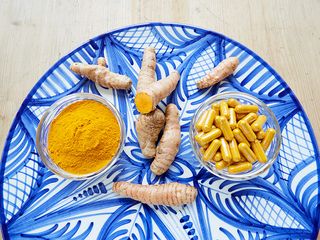
Before my appointment, I was given the choice to schedule either a straightforward consult (during which Chen would be able to recommend a regimen of herbs if she thought it was appropriate) or a consult (which would also include an acupuncture session). Since I felt I already had a grasp on acupuncture, I opted for the straightforward consult. However, after arriving at Yo San University and filling out a healthy amount of paperwork which painted a portrait of my current health status and any concerns (mostly the missing period, undulating levels of anxiety/worry, fatigue, and some issues of aches/pains that have haunted me for years), Chen almost immediately began poking me with needles as soon as I arrived in the consult room. (Yes, that's a tad of an exaggeration, but after asking me a few questions and re-evaluating my paperwork, she felt an acupuncture treatment—and a once-a-week practice thereafter—would be extremely helpful.)
Mid-prod, Chen explained to me that my missing period could be a result of many different things or a messier result of a bunch of issues combined—stress, abnormal hormone levels, too much sugar, or an underlying health problem could all be at fault. The acupuncture, she said, would help encourage fresh and healthy blood flow and energy, and she also confirmed that she felt the Chinese herbs would definitely be a helpful addition to help balance my hormones alongside my stress and anxiety levels. So after pricking me with needles in my head, hands, stomach, ankles, and feet, she let me lay in the dark (with a comforting, warm lamp situation) for 45 minutes as she formulated my herb cocktail and attended to other patients. She told me I could take the herbs either via capsules or powder, or leave with them in a rawer form. Ultimately, I opted for capsules, which she said many patients prefer.
(As a disclaimer, issues with menstruation and anxiety are highly personal, and my own experience and the advice, herbs, and treatment I've received are completely unique—if you have your own concerns, it's essential you talk to your healthcare provider or go in to see a master of Chinese medicine for a personalized consult.)
The Herbs
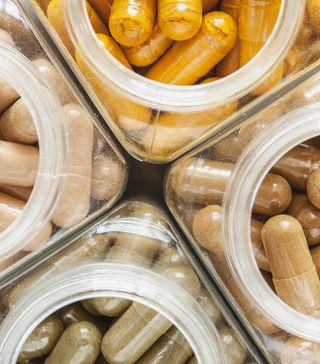
Prior to my appointment, I had grossly underestimated the number of herbs I'd be taking (15 if you're curious), not to mention the hefty dosage. Before I left the office, Chen handed me my bottle of encapsulated herbs and instructed me to take six of them at a time, three times a day (an amount that, as someone who's not thrilled by the prospect of taking supplements, was a hard pill to swallow—literally).
Then, in addition to the bottle of Chinese herbs, I also asked if I could receive a breakdown of the herb formula so I could later ask Beristain to help me decode what I was taking and why certain herbs would be prescribed to me versus others. Essentially, she'd help me understand Chen's strategy. Here's what went down. (And again, please realize the below represents just the highlights of a highly personalized Chinese antidote and is not intended in any way to advise or influence your own treatment.)
According to Beristain, (who actually studied under Chen), the formula I was prescribed is a classic combination of two different formulas, plus the addition of a few other herbs to serve as a modification/customization.
"What this formula is treating is the combination of two TCM patterns," she explained to me. "First, liver qi stagnation with liver blood and spleen qi deficiency, and second, heart yin deficiency with LV qi stagnation. Then, the additional customized herbs were added to address your possible symptoms of deficient heat, pain, and skin rashes or acne." (I had also told Chen I'd had an on-and-off struggle with acne over the past few years.) Specifically, Beristain outlined and explained the Chinese formulations as follows.
Part #1
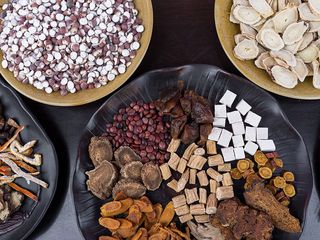
"Xiao Yao San (also known as rambling powder) treats the liver qi stagnation with liver blood deficiency and spleen qi deficiency. It helps to regulate cycles when it is determined that there is stress in conjunction with a deficiency of the elements in the body that are responsible for menstruation," she confirmed.
Chai Hu: "Helps to soothe the liver (stress), therefore allowing for the free flow of liver qi (responsible for healthy, timely cycles) and regulating menstruation."
Dang Gui: "This is a famous herb in the market. You can find it at Whole Foods and other natural grocers by the name of Dong Quai. This herb tonifies the blood first before moving it to help regulate your cycle."
Bai Shao: "Tones the blood and soothes the liver, therefore is perfect to regulate cycles due to deficiency and stagnation. It also helps protect yin, which represents body matter like blood, tissues, etc."
Bai Zhu and Fu Ling: "This is a famous pair which, when combined, will strengthen qi so that the body can perform its functions."
Zhi Gan Cao: "Another qi tonic which harmonizes the herbs in the formula so that they can work well together."
Part #2
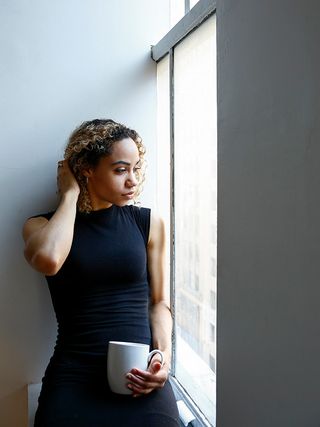
"Gan Mai Da Zao Tang (which features licorice, wheat, and jujube decoction) treats the heart yin deficiency with LV qi stagnation. It nourishes the heart and calms the spirit to help with irritability, anxiety, restlessness, and depression," Beristain explains.
Fu Xiao Mai: "This herb accesses the heart channel, nourishing the heart and calming the spirit." (According to TCM, the spirit "lives" in the heart, and the spirit is understood as the mind, emotions, and soul.)
Zhi Gan Cao: Beristain says this herb's function is similar to the above.
Da Zao: "It is a qi tonic, but in this formula, it is strengthening the blood and calming the spirit."
Customized Additions
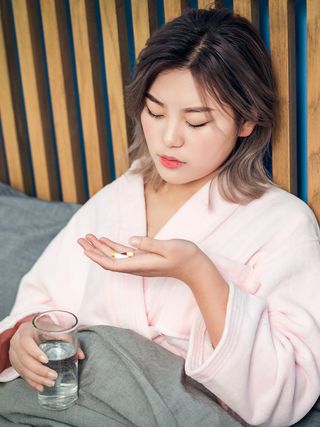
Chuan Xiong: "This herb is primarily a blood mover, but it also moves qi. It is possibly joining other blood movers in the formula to help bring back menstruation."
Xiang Fu and Mu Xiang: "Working together, these herbs are great to move qi and stop pain," Beristain tells me. "Xiang Fu is said to move qi within the blood to again bring back menstruation."
Xiang Fu and Yi Mu Cao: "These work together to regulate menstruation. Xiang Fu moves the qi, and Yi Mu Cao moves the blood; this is probably the number one herb when it comes to bringing back menstrual cycles."
Ge Gen: "Vents skin lesions. It also helps release muscle tension and to generate fluids in the body which might help with thirst, dry mouth, or acne."
Mai Men Dong: "This is yin-tonifying herb, which helps aid the herbs in Gan Mai Da Zao Tang to clear the heart from yin deficiency heat (when there is not enough yin in the body to balance yang, one can experience heat symptoms), and therefore relieve emotional distress caused by this deficiency."
Di Gu Pi: "Last but not least, this herb helps to clear the heat generated by a deficiency of yin. Yin, in this case, is referring to the elements in the body that are of a cold nature and that (among other functions) helps us maintain proper moisture and temperature levels. It also helps to stop bleeding, so my guess is that this herb is helping with a mild neutralizing effect against all the blood movers in this formula and so that the blood-moving action of the herbs to bring about menstruation is not excessively aggressive. Plus, it's also clearing the yin deficient heat in the heart that is causing anxiety, irritability, restlessness, and so on."
In conclusion, Beristain informed me that this personalized herb formula was strategically formulated to incorporate herbs which could work together to help bring back my MIA period in addition to relieving my anxiety by bringing together multiple goals common to TCM treatments: invigorating and nourishing the blood and the qi, regulating the liver qi, and nourishing the heart while also calming the mind.
Final Thoughts…
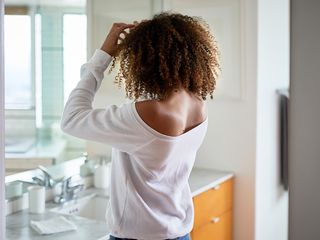
While I've only been taking the herbs for about one week and I was initially concerned I'd have a hard time sticking to the heavy regimen, it's actually been easier than I thought. I haven't noticed any marketable differences so far—positively or negatively—except I was convinced that I felt a little dizzy and nauseous the first few days of taking them, but this could have been completely unrelated, a placebo effect (because I'm prone to paranoia, ha) or due to not diligently taking the pills with meals, which I've slowly found to be crucial.
All in all, I'm optimistic, and I'm curious to see what happens over the course of the next several months. (Fear not, I plan on reporting back!) Additionally, I did ask both Chen and Beristain how long it might take to notice any kind of impact and when I might get my period back if the herbs worked, and they both said it's entirely dependent on the individual. (It could take a few weeks or a few months.) Plus, in addition to taking the herbs, I'll also be trying to incorporate acupuncture sessions more regularly (Chen and Beristain were both firm on this), and I'll be laying off the sugar, stress, and alcohol—or at least as much as possible—since excess can have a negative impact on the helpfulness of the treatment plan. Stay tuned!
Next up: These 9 Supplements Can Help With Inflammation, Arthritis, Fatigue, and More
Disclaimer
This article is provided for informational purposes only and is not intended to be used in the place of advice of your physician or other medical professionals. You should always consult with your doctor or healthcare provider first with any health-related questions.
Erin has been writing a mix of beauty and wellness content for Who What Wear for over four years. Prior to that, she spent two and half years writing for Byrdie. She now calls Santa Monica home but grew up in Minnetonka, Minnesota, and studied writing, rhetoric, and communication at University of Wisconsin, La Crosse. She studied abroad in Galway, Ireland, and spent a summer in L.A. interning with the Byrdie and Who What Wear family. After graduating from UW, she spent one year in San Francisco, where she worked as a writer for Pottery Barn Kids and PBteen before moving down to L.A. to begin her career as a beauty editor. She considers her day-to-day beauty aesthetic very low-maintenance and relies on staples like clear brow serum (from Kimiko!), Lawless's Lip Plumping Mask in Cherry Vanilla, and an eyelash curler. For special occasions or days when she's taking more meetings or has an event, she'll wear anything and everything from Charlotte Tilbury (the foundations are game-changing), some shimmer on her lids (Stila and Róen do it best), and a few coats of the best mascara-type product on earth, Surratt's Noir Lash Tint.
